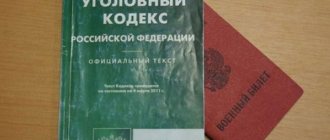As soon as property appeared in society, the need arose to protect it from criminal attacks.
In the legislation of many countries of the world, the rules of law on violations of rights have not undergone major changes, despite progress, changes in forms of government, political and other trends. Over time, only additions to existing norms appeared. Multi-channel free hotline Legal advice on criminal law. Every day from 9.00 to 21.00
Moscow and region: +7 (495) 662-44-36
St. Petersburg: +7 (812) 449-43-40
Concept
Criminal law provides a fairly clear understanding of crime. It is an action or inaction dangerous to society, committed through negligence or intentionally, with the aim of encroaching on property. It doesn’t matter who owns the property, crimes against property are carefully studied by criminal law.
It does not matter whether the damage is caused to the owner or to a person who has material wealth under other conditions provided by law. In any case, the attacker must be punished.
Legal characteristics include:
- An object.
- Objective side.
- Subject.
- Subjective side.
Encroachment on property by criminal acts provided for in Chapter 21 of the Criminal Code of the Russian Federation is aimed not only at private forms of property. It can also be related to state and other forms.
This offense undermines the role of the state as a guarantor, thereby causing serious harm to its image. That is why crimes against property of the Criminal Code of the Russian Federation are highlighted in a separate chapter of the main set of criminal laws of the country.
Property crime system
The system of criminal offenses under consideration in the Criminal Code of the Russian Federation distinguishes:
- theft of property belonging to someone on any basis, provided for in Art. 158, 158.1, 159.1, 159.2, 159.3, 159.5, 159.6, 160, 161, 162, 164, some paragraphs 159 of the Criminal Code;
- not related to theft;
- selfish offenses referred to in Articles 163, 165, partially 159;
- non-mercenary offenses provided for in Art. 166, 167, 168 CC.
The object of encroachment on private property of the Criminal Code of the Russian Federation is property relations of any form - be it use, possession or simply disposal.
In this case, encroachment should not be understood as an action aimed at physical possession of movable or immovable property. The acts provided for in the above-mentioned chapter are characterized by the desire of the subject to obtain the right to this or that property.
From the objective side, there is both an inactive and an effective form. The action consists of any manifestations of activity on the part of the accused of criminal behavior in order to obtain property that does not belong to him (car theft without the intention of stealing, Article 166 of the Criminal Code of the Russian Federation). Inaction occurs when we are talking about evasion from performing certain actions (careless destruction or damage to property).
The subjects of crimes against property rights are persons who are 16 years old at the time of commission. To bear responsibility for committing criminal acts provided for in 158, 161, 162, 163, 166, part 2 of Article 167, persons over 14 years of age are responsible.
The subjective side is expressed by negligence or intent (direct and indirect).
If the crime is committed with violence
Robbery can be:
- violent,
- non-violent.
As a general rule, robbery is open theft that does not have a violent content. However, there are cases when an attacker uses physical force on the victim that is not dangerous to life and health (clause “d” of Part 2 of Article 161 of the Criminal Code of the Russian Federation), that is, he commits open theft of someone else’s property using violence. This may be due to the desire to suppress the will of the victim, to avoid possible resistance, etc.
Let us consider this qualifying sign of robbery in more detail.
Non-dangerous violence refers to such actions that are characterized by a lesser degree of danger than causing minor harm to health (if the actions of the attacker lead to causing at least minor harm to health, then we are talking about robbery).
For example, non-dangerous violence is beatings and infliction of physical pain, which did not lead to adverse consequences for the physiology of the body, but caused physical pain (mild blows, bites, slaps, etc.) or limited freedom (tying hands, using handcuffs, etc.) .
Important! This sign can be imputed only when the person’s intent included inflicting some kind of physical pain and using this type of violence.
Let's look at an example from judicial practice
Kuloverov saw a man in the yard take out his mobile phone. He decided to kidnap him, so he approached the young man and hit him in the head several times to stop possible resistance on his part.
The victim felt physical pain and fell to the ground, and Kuloverov took a mobile phone and 100 rubles from the pocket of the man lying on the ground. After that, he left in an unknown direction.
Kuloverov’s violent actions only caused the man physical pain, so the Svobodnensky City Court of the Amur Region qualified Kuloverov’s actions as robbery with the use of violence not dangerous to health (clause “g” of Part 2 of Article 161 of the Criminal Code of the Russian Federation) and sentenced him to 2.5 years in prison freedom.
Recommended reading:
Concept and signs of robbery
Criminal legal characteristics of robbery
The difference between robbery and related compounds
Common Crimes
The most common crimes are:
- theft;
- robbery;
- robbery.
After many decades, despite the successes declared by the authorities in the fight against crime, the most common criminal violations in the field of property rights remain those listed above.
A common feature for these crimes is the desire of the subject of the crime to take possession of property (to commit theft). The object of this type of crime can only be movable property not connected to the earth’s surface, the movement of which is not capable of causing harm or modifying its purpose.
A characteristic feature of theft is the appropriation of the subject of the act, hidden from the owner, a person in possession of property on the basis of another form, or third parties, without their noticing. Such an act also occurs if the victims are physically present at the scene of the crime being committed, but realize that an act is being committed against them.
Robbery is characterized by an open form of theft. Then both the victim and the accused understand that a violation is being committed. It does not matter whether the victim created obstacles or not.
The greatest public danger comes from robbery, which involves the use or threat of physical violence and encroaches on the life or health of the victim.
To classify an act in each particular case, a comprehensive description of all components is necessary. This is necessary in order to exclude incorrect legal assessment. For theft and robbery, for example, the act must be completed. To qualify robbery, an attempted criminal offense is sufficient.
Factors predetermining property crime
The article discusses the main factors that predetermine property crimes. Characteristics of the levels of property crime are given. A historical account of the origins of property crime during the USSR period is provided.
Key words: factors of property crime, property crimes
The article discusses the main determinants of crime in terms of property. The characteristic levels of property crimes. Contains historical information of the origin of property crime in the Soviet period.
Property crime is crimes against property, as well as in the sphere of economics and economic activity, in the sphere of interests of the public service and the activities of commercial organizations, characterized by the fact that the ultimate goal and result of committing a crime is exclusively selfish property interest, obtaining property, money, rights to property illegally, with the addition of additional qualifying elements - abuse of official or official powers, use of commercial powers, use of violence, threat of violence, etc.
The most common are crimes against property, provided for in Chapter 21 of the Criminal Code of the Russian Federation - theft, robbery, robbery, fraud, embezzlement, etc.
The factors influencing property crime are very diverse and are sometimes difficult to take into account, since they are difficult to classify, study and analyze, which is associated with the formal nature of criminal prosecution and punishment - the law enforcement officer is interested in the very fact of conviction and imposition of punishment, serving it, but not failure to correct the convicted person or study the circumstances that prompted him to commit the crime. The most common answer from those who have committed theft or other property crime is the answer: “They needed money.”
Many researchers of this issue connect the level of property crime with the level of education, noting that the least educated segments of the population are most susceptible to committing property crimes - those with incomplete secondary education, lack of higher education, etc.
At the moment, it is impossible to agree with this point of view, since it has historically outlived its usefulness and cannot be recognized as corresponding to the realities of our time. The level of education has little effect on the level of property crime, since the quality of higher and secondary education in the country is very low, and education in terms of intellectual development brings little results. In addition, if we approach the factors of property crime from the intellectual side, then the least educated segments of the population commit the simplest types of property crimes - thefts, robberies, robberies, which are most easily solved, therefore official statistics take into account precisely these types of crimes. This outdated idea of the connection between education is based on the fact that, due to legal illiteracy, such criminals are easier to investigate and do not actively oppose the detection of crimes - despite the violent forms of such crimes, their social danger is many times less than those committed by criminals with a high intellectual level of development of crimes such as fraud, misappropriation or embezzlement of property, economic crimes, since they are difficult to solve and very difficult to develop.
Fraud in the real estate sector can rightfully be classified among the most highly intellectual and complex crimes of a property nature. Professional criminals of the highest intellectual level of development are concentrated here. In terms of public danger, the possibility of gratuitous theft of a citizen’s only residential premises is many times greater than any robbery or robbery, therefore highly intelligent economic criminals should be classified by statistics in the most significant category, therefore official statistics and the point of view on the influence of education on the level of property crime are fundamentally incorrect.
The highest level of property crime is in those areas where large capitals are circulated - these are the areas of government contracts, areas of large sectors of the economy, business, financial industries, metallurgy, oil and gas and mining industries, in which the commission of a crime can be detected solely on the basis of causing financial damage. These are non-violent, but purely economic crimes of a property nature. What motivates such criminals is very difficult to determine. Their level of education allows them to find a better job and even officially receive good money; socially, they also do not come from the lower strata of the population; intellectual development, if their intelligence were used for the benefit of the country, would allow them to be classified as an intellectual elite, but the direct purpose of such actions is Their crimes include obtaining large sums of money illegally.
It seems that the only factor that can be confidently attributed to influencing the commission of any property crimes - from the bottom to the top - is an unmotivated, unjustified, significantly inflated and initially “inflated” level of consumption. To consume by any means, and the more, the better, to consume even what is not needed at all, but is consumed by someone else - this is the main factor influencing the level of property crime. The consumer society is a deliberately sick society and is doomed to decay and decay, and a high level of property crime is the most characteristic symptom and sign of the decay and moral, ethical and intellectual degradation of such a society. Consumption should and must be limited to certain limits. When there are no such official frameworks, this pushes anyone who wants to consume to even greater levels of consumption, which often does not coincide with legal possibilities, and the person deliberately commits a crime, justifying himself by saying that everyone supposedly does this.
The low moral and moral standard in relation to the commission of property crimes is a bad legacy of the USSR, where any theft of non-state property was punished much less severely than the theft of state property or a political crime. Disregard for the individual, for the property of an individual and the instillation of fear and awe of state property, instilled over the course of 70 years by the Soviet justice, propaganda and penitentiary system, did their dirty work, and now Russia is reaping the benefits of Soviet history, having one of the highest levels of property and violent crime, while the object of crimes for the most part becomes private property, which is practically not protected in any way.
The formation and emergence in the USSR of a professional stratum of criminals, the so-called “thieves”, who aroused respect in society by committing exclusively property crimes, corrupted and corrupted the public consciousness, distorting it beyond recognition: we can say that theft, robberies and robberies, fraud with private property was officially encouraged in Soviet times and the deep echoes of this approval are not only heard now, but they form the ideological basis for modern ideologists of property crime. By right, the Soviet legacy, Soviet corrupting propaganda can be recognized, along with the social disease of increased consumption, as one of the main reasons for high property crime at the present time, since this level is formed by those who grew up in the USSR, whose parents and relatives were born and raised in the USSR .
Literature:
- Andrienko Yu. V. Economics of crime: theoretical and empirical study of the determining factors of crime: dissertation materials // Center for Economic and Financial Research and Development - Moscow - 2003.
- Babaev V.K. Legal system of society // General theory of law: Course of lectures / Under general. ed. V. K. Babaeva - Nizhny Novgorod - 1993
- Volkov V., Skugarevsky D. Criminal justice of Russia in 2009. Comprehensive analysis of judicial statistics. // Institute of Law Enforcement Problems. European University in St. Petersburg. — St. Petersburg — 2014
Other acts provided for in Chapter 21 of the Criminal Code of the Russian Federation
Fraud is given special attention in this group.
The general progress that has taken place in society, unfortunately, has not left the criminal class unattended. Thanks to newly opened opportunities in the financial, information sphere, and new trends in entrepreneurship, modernized types of fraud have also emerged, such as:
- fraud in the provision of lending services (Article 159.1 of the Criminal Code of the Russian Federation);
- fraud for the purpose of obtaining various types of payments (Article 159.2);
- fraud committed using plastic payment cards (Article 159.3).
While statehood develops, methods of criminal activity will develop and improve. That is why such an important element is the constant readiness to improve the rules of law, including criminal law, in order to maintain order in society and trust in the ruling authorities.





